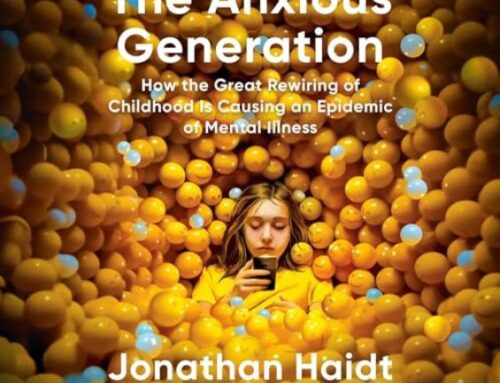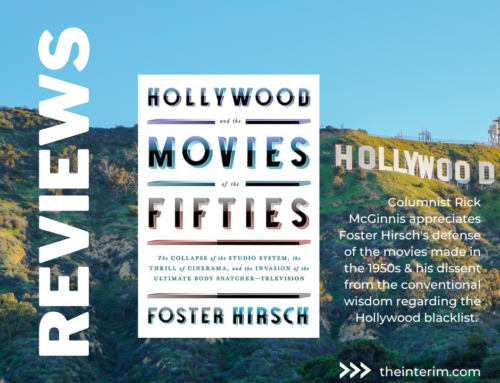 It’s a rare film that justifies its running time, and if over two decades’ worth of movie reviewing has taught me anything, it’s that every film, no matter how good, is probably too long. That proved itself once again with The Social Network, one of the films tipped early on as an Oscar favourite when it was released this fall. It’s just a minute over two hours long, and while hardly a waste of time, probably could have been released as a ten-minute short and said everything it had to with sufficient economy.
It’s a rare film that justifies its running time, and if over two decades’ worth of movie reviewing has taught me anything, it’s that every film, no matter how good, is probably too long. That proved itself once again with The Social Network, one of the films tipped early on as an Oscar favourite when it was released this fall. It’s just a minute over two hours long, and while hardly a waste of time, probably could have been released as a ten-minute short and said everything it had to with sufficient economy.
The film begins with, two undergraduates at a table, a boy and a girl, in a pub near Harvard University, which is their last date. Mark Zuckerberg, played by Jesse Eisenberg, is obsessing over Harvard’s final clubs, the exclusive and venerable societies that seem to show up in the biographies of almost every other notable American politician, chief justice or businessman. His date clearly doesn’t appreciate how imperative it is that Mark find his way into, say, the Porcellian, Owl, Delphic or Phoenix, and he can’t hide his impatience with her. After a minute or two of their increasingly furious bickering, it’s obvious that Mark probably has this problem with everyone else he meets.
It’s a dialogue showpiece from scriptwriter Aaron Sorkin, establishing the character of Mark Zuckerberg with indelibility and speed; he’s a math whiz kid, with what everyone – including his very-soon-to-be-ex-girlfriend – knows is a brilliant future in the world of computers. What he lacks, along with all but the tiniest minority at Harvard, is the pedigree necessary to get tapped for a final club, with its promise of sex and a high-end social life in the short run, and connections and wealth in the long run. Mark will likely get the latter, we’re sure, but the former is eluding him just at the moment, mostly because he is, as his by-now-ex-girlfriend tells him as the scene ends, a truly horrible human being (though the word she uses is far more succinct.)
Mark Zuckerberg is a real human being – as a Harvard undergraduate, he founded Facebook in 2004, the website that’s become the gold standard for social networking. He became a billionaire in that spectral economy of internet riches before he was 25, and was subsequently sued by a pair of the Winklevoss brothers, identical twins and Porcellian members who accused him of stealing their idea, and by his best friend, Eduardo Saverin, who provided the start-up cash for Facebook.
This kernel of a story was obviously too tempting for Sorkin and director David Fincher, who used it as the basis for a film whose doubtful adherence to strict reality has been detailed at length in magazine and newspaper articles and websites. Friends of Zuckerberg swear that what really happened was more like pizza, coding, videogames and the odd kegger, but Sorkin defended his dramatic license to New York magazine with a sentence that has to be the reining acme of moral sloth: “What is the big deal about accuracy purely for accuracy’s sake, and can we not have the true be the enemy of the good?”
Left alone after his ex-girlfriend delivers her coup de grace, the camera follows Eisenberg-as-Zuckerberg out of the pub and onto the street. As the credits roll, we see him make his way through the Harvard campus, in long shots and overhead angles, along streets that still teem with student life after dark. Before another word is spoken in the film, an evocative picture has been painted of the often aching loneliness of student life, and before Facebook is even mentioned, we have a pretty good reason why software that facilitates – or at least provides the illusion of – connection might be a runaway sensation.
After these two scenes, the balance of the film was almost unnecessary; the protagonist’s character was established with vivid clarity, and the emotional and social context for everything that was about to happen was more than palpable. Unfortunately, what actually comes next is mostly a legal procedural, flashing back and forth into not one, but two, legal boardrooms, and adds nothing to what the opening ten minutes tells us about the pitiful but obtuse nature of youth, even if it gets 1600 on its SATs.
Facebook began by catering exclusively to college students, but quickly expanded when the potential for monetizing “poking” and dubious quizzes became obvious. The exclusivity evaporated long ago, and now Facebook is the sort of place where your great aunt will friend you, in order to share cat videos and work on her family genealogy hobby. Nowadays it’s harder to find someone who hasn’t signed up, and terms like “Facebook addiction” will be essential when someone makes a period movie set in 2008. It’s ultimately why The Social Network fails, even if it will likely vie for a best picture Oscar – it began by promising a movie about our yearning for connection and acceptance, and ended up delivering a period picture about the internet.




